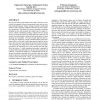Free Online Productivity Tools
i2Speak
i2Symbol
i2OCR
iTex2Img
iWeb2Print
iWeb2Shot
i2Type
iPdf2Split
iPdf2Merge
i2Bopomofo
i2Arabic
i2Style
i2Image
i2PDF
iLatex2Rtf
Sci2ools
134
click to vote
ATAL
2005
Springer
2005
Springer
Reciprocal resource sharing in P2P environments
Peer-to-peer (P2P) systems enable users to share resources in a networked environment without worrying about issues such as scalability and load balancing. Unlike exchange of goods in a traditional market, resource exchange in P2P networks does not involve monetary transactions. This makes P2P systems vulnerable to problems including the free-rider problem that enables users to acquire resources without contributing anything, collusion between groups of users to incorrectly promote or malign other users, and zero-cost identity that enables nodes to obliterate unfavorable history without incurring any expenditure. Previous research addresses these issues using user-reputation, referrals, and shared history based techniques. Here, we describe a multi-agent based reciprocity mechanism where each user’s agent makes the decision to share a resource with a requesting user based on the amount of resources previously provided by the requesting user to the providing user and globally in the ...
Related Content
| Added | 29 Jun 2010 |
| Updated | 29 Jun 2010 |
| Type | Conference |
| Year | 2005 |
| Where | ATAL |
| Authors | Dipyaman Banerjee, Sabyasachi Saha, Sandip Sen, Prithviraj Dasgupta |
Comments (0)

